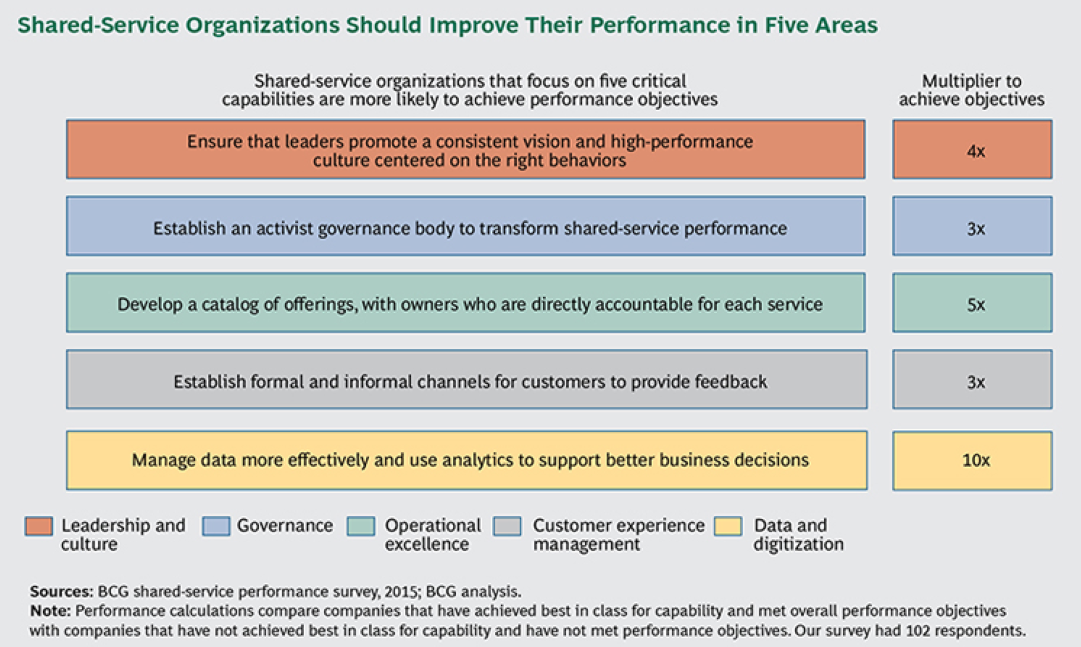BCG — Boston Consulting Group
By Andrew Toma, Fabrice Roghé, Matthew Marchingo, Rashi Agarwal, and Sebastian Kempf
MARCH 10, 2015
Key Messages
- 90 percent of Shared Services Organizations (SSOs) believe they haven’t achieved their performance objectives. That’s a clear missed opportunity, in both operational and financial terms.
- Our survey results point to five areas in which shared-service organizations should develop capabilities to enhance their performance: (1) Leadership and culture; (2) Governance; (3) Operational excellence (4) Customer experience management; (5) Data and digitization
- On the financial side, improving the performance of SSOs can lead to savings of 10 to 40 percent for expert functions, and 25 to 60 percent for transactional activities.
- On the operational side, improving the performance of shared-service organizations can lead to standardized processes and data across the company, increased transparency, and better performance among core operations.

FULL REPORT
Imagine a future in which shared-service organizations (SSOs) can improve companies’ overall financial and operational performance.
- Operational excellence is as important as efficiency. Cost reduction is no longer the sole objective or focus.
- Technology enables automated transactions and highly efficient processes.
- Performance dashboards give up-to-date performance indicators across the service portfolio, showing how the SSO is delivering accurate and responsive service in a cost-effective manner.
- The SSO has the highest culture scores of all major divisions and functions, and offers multiple career paths for experts and generalists.
- Shared-service employees take pride in functioning as service owners and constantly seek to improve the experience they deliver to internal customers.
- Most important, the SSO has a seat at the table during strategic discussions, with strong analytics capabilities and the capacity to generate data-driven insights that can support business leaders’ decisions.
Unfortunately, this is still a future vision for many companies today, where shared services can sometimes be treated as a dumping ground for the noncritical support tasks that no one pays much attention to-because they’re perceived as too tactical, not interesting, or not core to the company’s mission.
The Boston Consulting Group recently surveyed more than 100 shared-service leaders at companies of diverse sizes from all parts of the globe and across all major industries.
Our most critical finding was that 90 percent of the respondents believe they haven’t achieved their performance objectives. That’s a clear missed opportunity, in both operational and financial terms.
On the operational side, improving the performance of shared-service organizations can lead to standardized processes and data across the company, increased transparency, and better performance among core operations.
Shared services are also a key building block for transformations, helping companies respond to changes in their competitive environment.
They can streamline the integration process for acquisitions, and they are a principal driver of lean end-to-end processes throughout the company.
On the financial side, improving the performance of SSOs can lead to savings of 10 to 40 percent for expert functions, and 25 to 60 percent for transactional activities.
In other words, shared services can contribute to bottom-line decisions that make or break performance, and become a competitive differentiator for the company.
Such an approach does not require radical new technology or costly investments.
The tools are available today, and building these capabilities should be a critical part of every company’s strategic roadmap over the next two to three years.
Opportunities for Performance Improvement
Our survey results point to five areas in which shared-service organizations should develop capabilities to enhance their performance:
- Leadership and culture
- Governance
- Operational excellence
- Customer experience management
- Data and digitization
More specifically, the research also identifies the highest-priority capability in each of the five areas that will help SSOs improve, provided they make the required investments and take certain steps. (See the exhibit, “Shared-Service Organizations Should Improve Their Performance in Five Areas.”)

1.Leadership and Culture
Our research indicates that the biggest priority in this area is to ensure that leaders promote a consistent vision and high-performance culture centered on the right behaviors. The role of the shared-service leader has changed dramatically over the last decade. In the past, when SSOs were established primarily to streamline costs, standardize service, and build economies of scale, leaders were responsible only for tactical activities like reducing costs and improving processes. Now that most SSOs have largely achieved those objectives, leaders must also be strategic visionaries who can help the SSO enhance its partnership with the business units and constantly develop its service portfolio to identify and meet the needs of its customers.
As a result, SSOs that are advancing from a merely transactional role to become a true strategic partner to the business need to revise their vision and mission to promote operational excellence, continuously improve performance, and deliver quality services to customers.
Our research clearly shows these higher expectations. Among the experts we surveyed, 80 percent believe that leaders must define behaviors for shared-service employees and link those behaviors to performance reviews and KPIs. Critically, leaders must also build a culture in which employees live and breathe high performance and create value for the company by adopting a continuous-improvement mentality and delivering analytics-driven insight.
2.Governance
The most important capability in governance is to establish an activist body that can help transform shared-service performance. Many SSOs have traditionally established the governance body as a formality and tasked it primarily with evaluating historical performance. This approach is no longer sufficient. As customer expectations grow, shared services must be able to deliver, and stronger governance will help.
Best-in-class SSOs have a global cross-functional governance body that is highly active and can ensure compliance and control across key processes. This entity can evaluate KPIs and costs in real time and intervene as needed with strategic, operational, and tactical guidance to improve performance. This was the most important capability that our research identified, yet the current performance of many SSOs falls short. Nearly 70 percent of shared-service leaders in our research said they had room for improvement in achieving truly activist governance.
In addition, effective governance addresses SSO funding. Eighty-eight percent of shared-service leaders said that it’s critical to charge services back to customers-including line-item costs-as a self-funding mechanism. This approach gives SSOs the capital needed to invest in service improvements and encourages the right behavior among business clients. However, only 5 percent said they had mastered the art of establishing service-level agreements at the right premium to charge customers.
3.Operational Excellence
Within the realm of operational excellence, SSOs should focus on reducing costs and creating value through higher-quality services. More specifically, the highest priority is to develop a catalog of offerings. SSOs need to be transparent about their suite of services for customers. In fact, the process of defining those services-with the explicit goal of helping business units better achieve their objectives-requires a stronger partnership between SSOs and the business units they support.
Our analysis reinforces this concept. Among shared-service leaders, 90 percent believe it’s important to develop a service catalog. However, only 8 percent have established best practices in this area. A related concept is accountability. Ideally, each service is owned by a specific individual who is directly responsible for its performance-measured by clear metrics such as cost, accuracy, timeliness, or customer satisfaction. This accountability should go beyond mere designations or labels: service owners should have the power to make changes, including in the ownership of budget and staff, and they should be held accountable for shortcomings.
Survey participants indicated that they had work to do in this area as well: more than 90 percent either had service owners with no accountability or had significant room for improvement. Notably, improvement is not a onetime initiative. Rather, SSOs should develop a continuous-improvement capability that enables them to accurately measure their performance and get better over time. More than 90 percent of respondents believe that continuous improvement is a critical aspect of service owners’ accountability, yet roughly half do not have this capability in place.
4.Customer Experience Management
Effective SSOs understand that performance goes beyond delivering the right services at the right price. They must also develop their brand and increase their strategic role as partners to the business. To that end, shared services must identify customers and segment them into categories according to their needs, so that the SSO can more effectively tailor its offerings. Support for this approach was virtually universal in our analysis: 99 percent of respondents believe that it’s critical to identify and understand all customer types within the company. However, only 7 percent are offering tiered services by means of a modular approach that allows SSOs to adapt their offerings to customers with different needs.
In addition, the profile of customers in the company isn’t fixed-it evolves over time, in response to changes in the company and the overall competitive landscape. As a result, SSOs need a means to engage directly with customers, partners, and other stakeholders, such as formal and informal feedback channels. According to our analysis, this is the highest-priority capability in customer experience management. More than 90 percent of respondents identified formal feedback channels as a fundamental component to improving the SSO customer experience. However, just 20 percent of shared-service leaders use formal feedback to improve their performance, and only 5 percent said they had achieved best practices.
5.Data and Digitization
Advances in analytics, big data, mobility, the cloud, and software-as-a-service are creating significant opportunities for SSOs. Increasingly, data management and analytics are the foundation for quantitative decision making, helping SSOs identify emerging trends, prevent customer dissatisfaction, and limit financial risk. To get there, however, companies need to manage data more effectively and use analytics to generate insights that will support better business decisions. This is the highest-priority capability in this area.
Currently, less than 50 percent of shared-service organizations have achieved best-in-class capabilities in analytics to help customers make critical decisions. More than 90 percent still have issues regarding data quality and transactional accuracy, meaning they need to improve the way data is gathered, housed, and interpreted. To that end, a fundamental first step to establish analytics capabilities is to automate work flows and complex processes wherever possible. Automation increases accuracy and speed, and allows data to be captured more easily. Approximately 70 percent of shared-service leaders said that such automation is critically important, but about 40 percent have no automation capabilities in place.
For SSOs, the future is now. In a complex and dynamic business landscape, shared services can give companies a critical advantage by improving their performance. The challenge may seem complex, but SSOs can simplify the problem and give themselves a clear path forward by focusing on the five main capability areas we’ve identified:
- Leadership and Culture. Ensure that leaders promote a consistent vision and high-performance culture centered on the right behaviors.
- Governance. Establish an activist governance body to transform shared-service performance.
- Operational Excellence. Develop a catalog of offerings, with owners who are directly accountable for each service.
- Customer Experience Management. Establish formal and informal channels for customers to provide feedback.
- Data and Digitization. Manage data more effectively and use analytics to support better business decisions.
Together, these capability areas form a systematic means for SSOs to function more effectively, evolve beyond their traditional role as a mere processor of transactions, and claim their rightful place as a strategic partner to the company’s business units.
About the Authors

Andrew Toma
Managing Director & Senior Partner
Miami

Fabrice Roghé
Managing Director & Senior Partner
Düsseldorf

Matthew Marchingo
Partner & Associate Director, Digital Support Functions
London

Rashi Agarwal
Managing Director & Partner
New York
Originally published at https://www.bcg.com on January 8, 2021.












